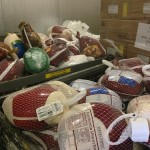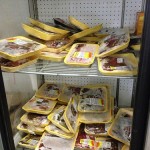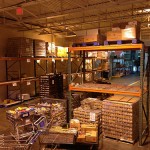Note from Volunteer Odyssey:
We’ll be incorporating guest posts about Memphis area nonprofits that are doing great work in the community.
We present Part 2 of a series about food banks from local journalist, Rachel Wilhite:
 Bob Fritchey is a busy man. His phone is ringing off the hook, having received at least five calls in the last fifteen minutes. He’s working on a deal to buy 1,500 turkeys for a dollar per pound and he wants them in the warehouse, ready to ship today. As the Food Resource Coordinator, Fritchey will be the first to tell you that the Mid-South Food Bank in Memphis, Tennessee, doesn’t like to go around with its hat in hand; it prefers to build relationships with donors.
Bob Fritchey is a busy man. His phone is ringing off the hook, having received at least five calls in the last fifteen minutes. He’s working on a deal to buy 1,500 turkeys for a dollar per pound and he wants them in the warehouse, ready to ship today. As the Food Resource Coordinator, Fritchey will be the first to tell you that the Mid-South Food Bank in Memphis, Tennessee, doesn’t like to go around with its hat in hand; it prefers to build relationships with donors.
But Fritchey hasn’t always been so busy. Before the passage of the Emerson Good Samaritan Food Donation Act, companies were afraid to donate to food banks because of liability concerns. Almost a decade ago, a Wal-Mart in Dyersburg, Tennessee had a situation in which their refrigeration system lost power briefly overnight. Consequently, all of the frozen and refrigerated food was pulled from store regardless if it had thawed or not. It was then shrink-wrapped and placed into a nondescript box to be shipped to an out-of-state landfill because store managers were worried that news of the incident would get out. They thought that if they shipped the food to a local landfill, someone would go through it and get sick in the process. This was a normal response to manage a store’s inventory quality back then. The majority of this food was unharmed and could have been donated to a food bank in need; instead, it was thrown out.
 Fortunately, this is no longer the case. “The truth is,” Fritchey stated, “as long as a company is willing to donate food products to a legitimate non-profit and they’re doing it with the intent that the product is still good along with the desire to feed people, there is almost zero liability associated with it thanks to the Good Samaritan Food Donation Act.” The act encourages food donations by shielding both donor and recipient agencies from liability issues except in extreme cases. Since its passage, the Good Samaritan Food Donation Act has opened the Mid-South Food Bank’s doors to a lot of major companies such as Sara Lee, Hillshire Farms, Family Dollar, Riviana Foods, Kroger and Wal-Mart.
Fortunately, this is no longer the case. “The truth is,” Fritchey stated, “as long as a company is willing to donate food products to a legitimate non-profit and they’re doing it with the intent that the product is still good along with the desire to feed people, there is almost zero liability associated with it thanks to the Good Samaritan Food Donation Act.” The act encourages food donations by shielding both donor and recipient agencies from liability issues except in extreme cases. Since its passage, the Good Samaritan Food Donation Act has opened the Mid-South Food Bank’s doors to a lot of major companies such as Sara Lee, Hillshire Farms, Family Dollar, Riviana Foods, Kroger and Wal-Mart.
Even still, the food bank and its associate pantries are often at the mercy of unpredictable donations and overstocked inventory. Occasionally Fritchey gets a call to pick up pallets of food from a truck driver stuck at a weigh station who is overweight and in a hurry to get back on the road. “I don’t deal with donations received by the bag. I go after the truckloads,” Fritchey said. Many truck stop managers have established relationships with their local pantry operators, directing their drivers to deliver their rejected merchandise to their doorsteps, no matter what time of night it is.
 Businesses competing with one another in order to have a strong public perception of quality will begin pulling produce from their shelves long before its expiration date because it is no longer aesthetically pleasing to the customer. “We get a lot of stuff from the distribution center in New Albany, Mississippi. Gary [Hall] will call me with stuff they need to get rid of,” Fritchey said. “It could be anything.”
Businesses competing with one another in order to have a strong public perception of quality will begin pulling produce from their shelves long before its expiration date because it is no longer aesthetically pleasing to the customer. “We get a lot of stuff from the distribution center in New Albany, Mississippi. Gary [Hall] will call me with stuff they need to get rid of,” Fritchey said. “It could be anything.”
Gary Hall has worked at multiple Wal-Mart Distribution Centers for 26 years, 13 of which have been spent in the New Albany facility. As a Quality Assurance Manager, it is his job to ensure that all products are up to standard regardless of their final destination. The New Albany outfit stocks 126 dry goods stores as well as 103 perishable goods stores. It is also currently home to about 200,000 turkeys waiting to be sold throughout the holiday season. Hall has donated ten turkeys to the Mid-South Food Bank so far, but with this kind of stock, more are bound to follow.
Hall began donating to the food bank five years ago, due in part to its commitment to serving the region to which his store belongs. New Albany’s local food pantry, the Good Samaritan Center, is supported by the Mid-South Food Bank and also accepts aid from the community—including outsiders who are just passing through. Many donations are obtained from truck drivers whose loads are rejected. Recently, the Good Samaritan Center received several cases of onions that had fallen off a pallet. The onions were not accepted by the grocer for fear that they would be bruised and unsellable. Left with merchandise to unload, the driver contacted the pantry, where he knew the produce would be accepted without question. Donations like this are described as “happy accidents,” and thanks to the federal Good Samaritan Food Donation Act, along with the relationships made throughout the supply chain, this food is no longer going to waste.
Hall says his drivers contribute differently. “Our donations our generally consumer-controlled, not accidental. All our buyers have to go off of is how much we sold last year. If there winds up being overstock, it gets donated.” Items that are store brand, such as Great Value or Sam’s Choice, are a separate story. Wal-Mart does not allow these items to be donated. Hall says that the company’s reasoning is that the donation of these goods could have direct, undue influence over individuals. “We don’t want that kind of exposure,” he said. “A can of Del Monte tomatoes could have come from anywhere. A can of Great Value tomatoes can obviously be linked back to us.”
Regardless of how goods find their way to the Mid-South Food Bank, we can be assured that they are benefiting someone in need. The Mid-South Food Bank distributes about a million pounds of food per month to their associate pantries in eighteen counties in Tennessee, Mississippi and Arkansas. The local food industry—from warehousing to retail—proves to be a valuable resource for the bank, providing exactly 31 percent of the bank’s annual inventory. This is one of the crucial sources of donations that Fritchey attempts to secure access to. “Every year there is over 100 billion pounds of food wasted in this country. That’s enough to feed every single man, woman and child an extra 1,500 pounds (of food) a year and it’s just wasted. It’s wasted for cosmetic reasons, people cooking too much…from the field to the table, there are all these places where food is wasted. If we can recoup some of that and give it to those in need, it’s the right thing to do. It’s not rocket science; it’s what we should be doing.” By working to build relationships with food distribution centers, retailers and others in the food transportation industry, Fritchey is helping ensure that’s exactly what happens.
See more of Rachel’s pictures from the Mid-South Food Bank:
http://www.flickr.com/photos/rlwilhite/sets/72157632115374385/
By Rachel Wilhite
Twitter: @rachwilhite



